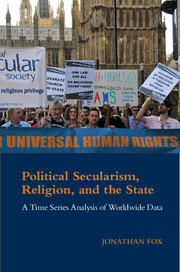Book contents
- Frontmatter
- Contents
- Acknowledgments
- 1 Introduction
- 2 Secularism or Secularization? The Secular-Religious Competition Perspective and Beyond
- 3 Establishment, Support, Neutrality, or Hostility: The Varieties of Official Religion Policy
- 4 State Support for Religion
- 5 Regulation, Restriction, and Control of the Majority Religion or All Religions
- 6 Religious Discrimination
- 7 Education, Abortion, and Proselytizing
- 8 Religion in Constitutions
- 9 Conclusions
- Appendix Data Collection and Reliability
- Bibliography
- Index
8 - Religion in Constitutions
Published online by Cambridge University Press: 05 May 2015
- Frontmatter
- Contents
- Acknowledgments
- 1 Introduction
- 2 Secularism or Secularization? The Secular-Religious Competition Perspective and Beyond
- 3 Establishment, Support, Neutrality, or Hostility: The Varieties of Official Religion Policy
- 4 State Support for Religion
- 5 Regulation, Restriction, and Control of the Majority Religion or All Religions
- 6 Religious Discrimination
- 7 Education, Abortion, and Proselytizing
- 8 Religion in Constitutions
- 9 Conclusions
- Appendix Data Collection and Reliability
- Bibliography
- Index
Summary
In theory, laws and especially constitutions determine a state's policy. This is to a great extent true, at least for declared policy. However, governments do not always follow their own rules, even if those rules are set out in constitutions. A specific clause in a constitution can often be ignored without violating the general constitutional framework. US constitutional doctrine, for example, allows considerable room for interpretation. The US Supreme Court ruled in Griswold v. Connecticut (1965) that the US Constitution protects the right to privacy, even though no such right was explicitly written into the constitution. Eight years later in Row v. Wade (1973), the court extended the right of privacy to include abortions, another issue not contained in the written word of the Constitution. Thus, the written word is not always a perfect guide even in states that respect their laws and constitutions. Many states are less respectful of their own rules and laws than is the United States.
In this chapter, I examine the correlation between religion policies declared in constitutions and state policy in practice. The results in previous chapters demonstrate that official religion policy has an influence on actual religion policy but it is not fully determinative. As demonstrated in Chapter 4, declaring an official religion, for example, makes a state more likely to support religion but many states without official religions support religion more strongly than many states with official religions.
I examine two types of policy in this chapter. The first is declaration or establishment of an official religion (EOR) or separation of religion and state (SRAS). The second is whether the constitution protects religious freedom. Overall, I find that while there is link between constitutional principles and actual policy, this link is far weaker than many would assume.
The Link between Constitutions and Policy: Theory and Practice
Evidence already presented in this book suggests that constitutional declarations do not always determine actual policy. In Chapter 4 (Table 4.10), I examined the link between official state policy – usually as declared in the state's constitution – and support for religion.
- Type
- Chapter
- Information
- Political Secularism, Religion, and the StateA Time Series Analysis of Worldwide Data, pp. 201 - 230Publisher: Cambridge University PressPrint publication year: 2015

